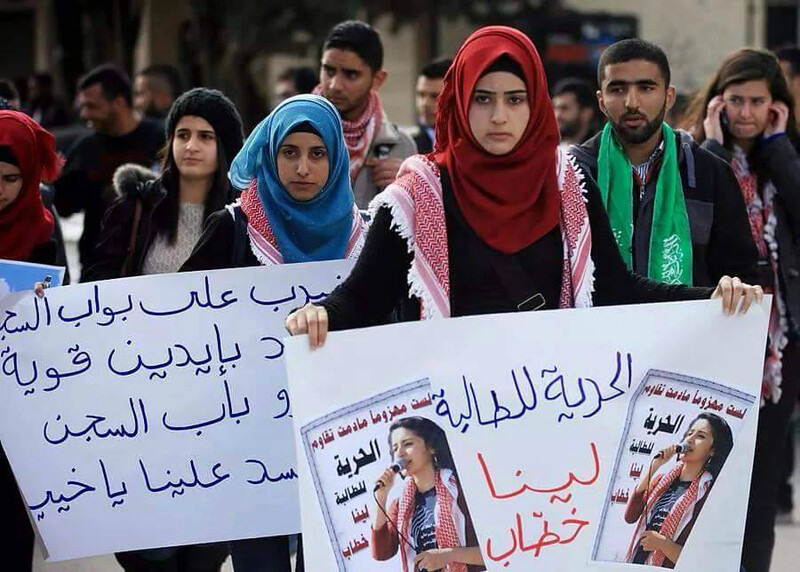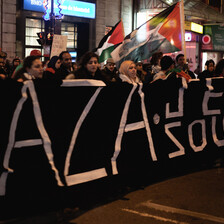The Electronic Intifada Beirut 13 February 2015

Birzeit University students marched on campus calling for the release of Lina Khattab and other imprisoned Palestinian students in December. (Photo courtesy of Progressive Democratic Student Pole at Birzeit)
Lina Khattab, 18, is in her first year of media studies at Birzeit University in the occupied West Bank. An accomplished dancer, she is a member of the renowned troupe El-Funoun.
She was arrested by the Israeli military on 13 December as she joined fellow university students in a march to Israel’s Ofer prison, which holds Palestinian political prisoners.
El-Funoun has produced a video of scenes from her arrest spliced with some of her performances with the troupe, which specializes in the traditional Palestinian dance dabke.
Khattab has now been imprisoned for nearly two months and brought before the military court at Ofer nine times. Her last hearing on 25 January was a closed session; no family or observers were allowed to enter the military court.
Her next appearance before the military court is scheduled for 16 February. Israeli military prosecutors are scheduled to present witnesses against her.
Khattab is charged with “throwing stones” and “participating in an unlawful demonstration.” Samidoun, a network of North America-based activists supporting Palestinian prisoners, notes that these are “frequent and arbitrary charges leveled at Palestinians who participate in or are near popular demonstrations against the Israeli occupation.”
“In the last couple of years, it was not so common to arrest women for throwing stones, but we believe this case is part of increasing attacks on peaceful resistance activities,” said Sahar Francis, director of Addameer, a group campaigning for the rights of Palestinian prisoners.
“Lina is now being held until the end of her legal procedures in front of the military court in Ofer. Our appeal of the decision to keep her in detention while on trial was refused by the military court of appeal,” Francis told The Electronic Intifada.
Khattab’s appearances before the Israeli military court were repeatedly postponed as her lawyers sought her release on bail.
“Shackled hand and foot”
The first time that Khattab’s family was able to see her following her arrest was during a court appearance.
“Lina was brought into court, surrounded by a large troop of soldiers, her hands and feet cuffed. The court would not allow me to touch her and talk to her,” said Samira Shaladeh, Lina’s mother. “I said that I am Lina’s mother, and it is my right to touch her and hug her, but the judge refused and told me that it is forbidden.”
“I am a mother, my daughter was in front of me and I was forbidden from expressing my feelings. My baby was shackled hand and foot and I can do nothing. This occupation and the silence of the world are killing our children,” Shaladeh told The Electronic Intifada.
Palestinian writer and activist Mariam Barghouti observed Khattab’s court hearing on 12 January. Khattab was refused bail on that occasion. When the court was adjourned, the judge remarked, “looking at her, I can see the characteristics of a leader,” Barghouti wrote on her blog.
“Legally, we do not understand the position of the court, taking into consideration the fact that this is the first time Lina was arrested. None of our suggestions to guarantee her release were accepted by the court. The court refused to release her on bail, which means she will lose her academic year, even if we prove she is innocent,” said Addameer’s Francis.
No confession
Military courts convict the Palestinians brought before them in more than ninety-nine percent of cases, according to 2011 data from the Israeli court system.
As noted by the US National Lawyers Guild, the use of plea bargains — frequently extracted through the fear of harsher sentences and the existence of confessions often obtained through torture — has played a major role in the ongoing functioning of the Israeli military court system.
“What is special in Lina’s case,” said Francis, “is that the evidence against her consists only of the statements of three policemen who arrested her, claiming she was throwing stones. She did not confess.”
Shaladeh does not see her daughter’s case as an individual experience, but as rooted in Palestinian collective identity and experience.
“Lina represents an entire people uprooted from their land by force of arms. Every day the occupation strikes and kills and demolishes, arrests, desecrates holy places, takes away farmers’ land and builds settlements. It forces Palestinians out while seeking to bring Jews from around the world to support its claims to a fake democracy,” Shaladeh explained.
“The truth is that the Palestinian people want to recover their homeland and achieve freedom for their people, and Lina is a part of this truth, rejecting steadfastly all of this violence against our people.”
Family denied visits
Khattab is held in Hasharon prison inside present-day Israel with twenty other Palestinian women and girls. One of the girls imprisoned there recently, Malaak al-Khatib, is only fourteen years old.
The security system at Hasharon is provided by the British-Danish security corporation G4S, the subject of a global boycott campaign.
Khattab’s family members have been denied security permits to visit her inside the prison. As Palestinians holding West Bank identity cards, they require special security permission to enter Israel. The practice of Israel, as the occupying power, removing prisoners from the West Bank and Gaza and detaining them in Israel, is forbidden by the Fourth Geneva Convention. But it is standard practice for the Israeli military.
As of 1 December, there were 6,200 Palestinian political prisoners in detention. The vast majority of them are held in prisons inside Israel.
“Morale is high”
Despite the denial of family visits, Shaladeh said that “Lina is still holding strong in the prison and her morale is high. Imprisonment does not worry her. Lina rejects the fabricated charges against her.”
“They treated Lina as if she is so dangerous, such a serious security threat — this is what makes us believe that they are using her case in order to frighten students from being involved in activism,” said Francis.
Palestinian student organizing is criminalized by the Israeli occupation. There are frequent reports of arrests of students, particularly those who are involved in student groups or electoral blocs in the student unions of Palestinian universities.
“It is very typical [to arrest Palestinian students]. Many students are targeted for their activities as students … Actually being a member of any student movement is a crime according to Israeli military orders,” Francis said, noting that Palestinian students can face more than a year of imprisonment simply for being a member of a student organization.
Sumoud Abu Khdeir, a friend of Khattab and an activist with the Democratic Progressive Student Pole at Birzeit, said that arrest and imprisonment is a common experience for Palestinian students.
“I have known Lina since we were very young. Since her childhood, Lina attended all of the mass activities and popular demonstrations against the occupation and its policies. Lina’s arrest did not weaken her resolve, nor did it lessen the determination of her fellow students, comrades and friends,” Abu Khdeir told The Electronic Intifada.
“The occupation is only proving Lina’s strength and commitment to the justice of her cause,” she added.
The Progressive Democratic Student Pole has organized several rallies on campus calling for Khattab’s release, as well as the release of other students imprisoned in Israeli jails.
Shaladeh urged international action to call for Lina’s freedom. There is a Facebook page urging her release and several online petitions drawing attention to her case, which have been translated into French, Italian and Spanish.
“I urge the solidarity organizations, those around the world who defend the rights of the Palestinian people, to raise the slogan of freedom for the student Lina Khattab and all imprisoned Palestinian students. She has the right to study media, like every other student at Birzeit University. We are struggling for Lina’s right to her freedom, to re-enter school and live her life like youth around the world,” said Shaladeh.
“Lina dreams of a free Palestine, free from all forms of violence and oppression,” Shaladeh added. “She is a voice of truth and dignity in this unjust world.”
Charlotte Kates is the coordinator of the Samidoun Palestinian Prisoner Solidarity Network. Based in Beirut, she is also the coordinator of the US National Lawyers Guild International Committee and a member of the organizing collective of the US Campaign for the Academic and Cultural Boycott of Israel.





